- Home
- Kelley Armstrong
Dime Store Magic Page 2
Dime Store Magic Read online
Page 2
"Heading out for spell practice?" she said, pointing at my knapsack. "What are you working on?"
"Making you a snack. White milk or chocolate?"
Dramatic sigh. "Come on, Paige. I know what kind of stuff you practice. I don't blame you. Those Coven spells are for five-year-olds."
"Five-year-olds don't cast spells."
"Neither does the Coven. Not real spells. Oh, come on. We can work together. Maybe I can get that wind spell working for you."
I turned to look at her.
"You wrote in your journal that you were having trouble with it," she said. "Sounds like a cool spell. My mom never had anything like that. Tell you what--you teach me that one and I'll show you some real magic."
"You read my journal?"
"Just the spell practice journal. Not your personal one."
"How do you know I have a personal one?"
"Do you? Hey, you know what happened at school today? Mr. Ellis told me he's sending two of my paintings to get framed. They're going to hang them at graduation next week."
Savannah headed for the kitchen, still talking. Should I pursue the journal comment? I considered, then rejected it. Instead I hefted my knapsack and headed to my room to return the bag to its hiding spot.
If Savannah did read my personal journal, at least it meant she was taking an interest in me. Which was good. Unless she was snooping in hopes of finding something she could use to blackmail me into buying her a cell phone. Which wouldn't be so good. What exactly did I have in my journal, anyway ... ?
While I was locking away my bag, the doorbell rang. Savannah shouted "Got it" and thundered into the hallway, making enough noise for someone three times her size. When I walked into the living room a few minutes later, she was standing in the hall doorway, lifting a letter to the light and squinting at it.
"Testing your psychic abilities?" I said. "A letter opener works much faster."
She jumped and jerked the letter down, hesitated, then held it out.
"Ah, for me. In that case, I'd advise steaming it open." I took the letter. "Registered mail? That bumps it up from simple mail fraud to mail fraud plus forgery. I hope you're not using that skill to sign my name to any notes at school."
"As if," she said, heading back toward the kitchen. "What would be the good of skipping school in this town? No mall, no Starbucks, not even a Mickey D's."
"You could hang around outside the hardware store with the rest of the kids."
She snorted and disappeared into the kitchen.
The envelope was standard letter-sized, no unusual markings, just my name and address handwritten in clean, exact strokes and a return address preprinted in the upper left corner. The sender? A California law firm.
I tore it open. My eyes went straight to the first line, which requested--no, demanded--my presence at a meeting tomorrow morning. The first thing I thought was: "Oh, shit." I suppose that's the normal reaction for anyone receiving an unexpected legal summons.
I assumed it had something to do with my business. I created and managed company websites for women tired of male web designers who thought they'd want nothing more technically challenging than floral wallpaper. When it comes to the Internet, the issue of copyright is as murky and convoluted as a celebrity prenup so, seeing a letter filled with legal jargon, I assumed I'd done something like design a Flash sequence that inadvertently bore some passing similarity to one on a website in Zaire.
Then I read the next line.
"The purpose of this meeting is to discuss our client's petition for custody of the juvenile, Savannah Levine ..."
I closed my eyes and inhaled. Okay, I'd known this could happen. Savannah's only living relative was one of the Coven Elders, but I always assumed Savannah's mother might have had friends who would be wondering what became of Eve and her young daughter. When they discovered that a great-aunt had taken custody of Savannah and handed her over to me, they'd want answers. And they might want Savannah.
Naturally, I'd fight. The problem was that Savannah's aunt Margaret was the weakest of the three Elders, and if Victoria insisted Margaret relinquish custody, she would. The Elders hated trouble; they broke into collective hives at the mere prospect of drawing attention to the Coven. To secure their support, I'd need to persuade them that they'd face graver personal danger by giving up Savannah than by keeping her. With the Elders, it always came down to that: what was best for them, safest for them.
I scanned the rest of the letter, sifting through the legal jargon to find the petitioner's name. When I found it, my stomach dropped to my shoes. I couldn't believe it. No, strike that. I believed it only too well. Cursed myself for not seeing it coming.
Did I mention how my mother died? Last year, a small group of humans learned about the supernatural world and wanted to harness our powers, so they kidnapped a sampling of powerful supernaturals. One of those was Savannah's mother, Eve. Savannah had the misfortune to be home from school that day and was taken as well.
Eve, however, quickly proved more dangerous than her captors expected, so they killed her. As a replacement, they targeted my mother, the elderly leader of the Coven. My mother was taken, along with Elena Michaels, a werewolf. There they met another captive, a half-demon who would later kill my mother and blame Savannah--part of an intricate plot to take control of Savannah, and so gain access to a young, malleable, and extremely powerful neophyte witch.
That half-demon's name? Leah O'Donnell. The same name that now stared up at me from the custody petition.
CHAPTER 2
HOME SECURITY
Leah was a telekinetic half-demon of the highest order. A half-demon is the offspring of a male demon and a female human. Half-demons always look human, taking after their mother. What they inherit from their father depends on what kind of demon he is. For Leah, that power was telekinesis. That means she could move things with her mind. Only don't think sideshow spoon-bending. Think of a woman who can mentally hurl a steel desk into a wall--literally into a wall, with such force that the desk embeds itself in the plaster and obliterates anything in its path.
Not surprisingly, then, the first thing I did upon reading this letter was rush around securing the house. After fastening the door locks and pulling the blinds, I moved to less conventional security. At each door I cast a lock spell, which would hold them closed even if the dead bolts failed. Next I used perimeter spells at all the doors and windows. Think of perimeter spells as supernatural security systems. No one could enter the house without my knowing it.
All of these were Coven-sanctioned spells, though a few months ago one witch felt it her duty to point out that a lock spell could be used for evil, if we ever took it upon ourselves to lock someone in a room, instead of keeping them out. Would you believe the Coven actually convened a special meeting of the Elders to discuss this? Worse yet, the Elders voted two to one to outlaw the second-level spell, leaving us the first-level spell, which could be broken with a strong twist on the doorknob. Fortunately, my vote carried extra weight, so the motion failed.
Savannah walked in as I was casting the perimeter spell across the bottom of our unused fireplace.
"Who are you trying to keep out?" she asked. "Santa Claus?"
"The letter. It's from Leah."
She blinked, surprised but not concerned. I envied her that.
"Okay," she said. "We expected this. We're ready for her, right?"
"Of course." Was it my imagination, or did my voice just tremble? Inhale, exhale ... now once more, with confidence. "Absolutely." Oh, yeah, that sounded about as confident as a cornered kitten with three broken legs. I turned and busied myself casting perimeter spells at the living room windows.
"So what was in the letter?" Savannah asked. "A threat?"
I hesitated. I can't lie. Well, I can, but I'm lousy at it. My nose might as well grow, my falsehoods are so obvious.
"Leah ... wants custody of you."
"And?"
"There's no 'and.' She wants to take
custody of you, legally."
"Yeah, and I want a cell phone. She's a bitch. Tell her I said so. And tell her to fuck--"
"Savannah."
"Hey, you allowed 'bitch.' Can't blame me for testing the boundaries." She shoved an Oreo in her mouth. "--Go--gi--geen."
"The correct sequence is: chew, swallow, talk."
She rolled her eyes and swallowed. "I said: you know what I mean. ' Witch-slave' wasn't my choice at career day last week. Tell her I'm not interested in what she's selling."
"That's good, but it might take more than that to change her mind."
"But you can handle it, right? You sent her packing before. Do it again."
I should have pointed out that I'd "sent her packing" with lots of help, but my ego resisted. If Savannah thought I'd played a significant role in beating Leah last time, there was no need to enlighten her now. She needed to feel secure. So, in the interest of ensuring that security, I returned to my perimeter spells.
"I'll go do my bedroom windows," she said.
I nodded, knowing I'd redo them when she wasn't looking. Not that Savannah lacked proficiency in level two spells. Though I hated to admit it, she'd already surpassed me in all levels of Coven magic. I'd redo her spells because I had to, for peace of mind. Otherwise I'd worry that she'd missed a window or rushed through the incantation or something. It wasn't just Savannah. I'd do the same with any other witch. I'd feel better knowing I'd done it myself.
I don't remember what I made for dinner. By seven Savannah was in her room, which might have worried me except that she disappeared after dinner almost every night--before I could ask for help clearing the table--and spent the next few hours in her bedroom, ostensibly doing homework, which somehow involved ninety-minute phone calls to school chums. Group homework. What can I say?
Once Savannah was in her room, I turned my attention back to the letter. It demanded my presence at a ten o'clock meeting the next morning. Until then, I could do little but wait. I hated that. By seven-thirty I resolved to do something, anything.
I had one lead to pursue. The letter was from a lawyer named Gabriel Sandford, who worked at Jacobs, Sandford and Schwab in Los Angeles. Odd. Very odd, now that I thought about it. Having an L.A. lawyer would make sense for someone living in California, but Leah was from Wisconsin.
I knew Leah hadn't moved--I made discreet biweekly inquiries to her station. By "station," I mean police station. No, Leah wasn't in jail--though I knew of few people who belonged behind a stronger set of bars. Leah was a deputy sheriff. Would that help her custody case? No sense dwelling on that until I knew more.
Back to the L.A. lawyer. Could it be a ruse? Maybe this wasn't a real legal case at all. Maybe Leah had invented this lawyer, placing him in a huge city as far from Massachusetts as possible, and assumed I wouldn't investigate.
Though the phone number was on the letterhead, I called 411 to double-check. They provided a matching address and phone number for Jacobs, Sandford and Schwab. I called the office, since it was only four-thirty on the West Coast. When I asked for Gabriel Sandford, his secretary informed me that he was out of town on business.
Next, I checked out Jacobs, Sandford and Schwab on the web. I found several references on sites listing L.A. law firms. All mentions were discreet, none encouraging new business. It didn't seem like the kind of firm a Wisconsin cop would see advertised on late-night TV. Very strange, but I'd have to wait until tomorrow to find out more.
With morning came a fresh dilemma. What to do with Savannah? I wasn't letting her go to school with Leah in town. And I certainly wasn't taking her with me. I settled for leaving her with Abigail Alden. Abby was one of the very few Coven witches to whom I'd entrust Savannah, someone who'd protect her without question and without telling the Elders.
East Falls was only forty miles from Boston. Yet, despite its proximity, people here didn't work in Boston, didn't shop in Boston, didn't even go to concerts or live theater in Boston. People who lived in East Falls liked their small-town ways and fought viciously against any encroachment from the big bad city to the south.
They also fought against incursions of another sort. This region of Massachusetts is overflowing with beautiful villages, replete with gorgeous examples of New En gland architecture. Among these, East Falls took its place as one of the best. Every building in the downtown area dated back at least two hundred years and was kept in pristine condition, in accordance with town law.
Yet you rarely saw a tourist in East Falls. The town didn't just fail to promote tourism, it actively worked to prevent it. No one was allowed to open a hotel, an inn, or a bed-and-breakfast in town, nor any sort of shop that might attract tourists. East Falls was for East Falls residents. They lived there, worked there, played there, and no one else was welcome.
Four hundred years ago, when the Coven first came to East Falls, it was a Massachusetts village steeped in religious prejudice, small-mindedness, and self-righteous morality. Today, East Falls is a Massachusetts village steeped in religious prejudice, small-mindedness, and self-righteous morality. They killed witches here during the New England witch trials. Five innocent women and three Coven witches, including one of my ancestors. So why is the Coven still here? I wish I knew.
Not all Coven witches lived in East Falls. Most, like my mother, had moved closer to Boston. When I was born, my mother bought a small two-story Victorian on a huge corner lot in an old Boston suburb, a wonderful tight-knit little community.
After she died, the Elders insisted I relocate to East Falls. As a condition of my taking custody of Savannah, they wanted me to move where they could keep an eye on us. At the time, blinkered by grief, I'd seen their condition as an excuse to flee painful memories. For twenty-two years, my mother and I had shared that house. After her death, every time I heard a footstep, a voice, the closing of a door, I'd thought "It's just Mom," then realized it wasn't, and never would be again. So when they told me to sell, I did. Now I regretted my weakness, both in surrendering to their demand and in giving up a home that meant so much to me.
Leah's lawyer was holding the meeting at the Cary Law Office in East Falls. That wasn't unusual. The Carys were the only lawyers in town, and they made their meeting room available to visiting lawyers, for a reasonable fee--the Carys' typical blend of small-town hospitality and big-city business sense.
The Carys of East Falls had been lawyers for as long as anyone could remember. According to rumor, they'd even been around during the East Falls witch trials, though the gossipmongers are divided over which side the Carys served on.
Currently the office had two lawyers, Grantham Cary and Grantham Cary, Jr. My sole legal dealing in East Falls had been the title transfer on my house, which had been handled by Grant junior. The guy invited me out for a drink after our first meeting, which wouldn't have been so bad if his wife hadn't been downstairs manning the receptionist desk. Needless to say, I'd since taken my business legal matters elsewhere.
For as long as the Carys had been lawyers, they'd practiced out of a monstrous three-story house in the middle of Main Street. I arrived at the house at nine-fifty. Once inside, I noted the location of each employee. Grantham junior's wife, Lacey, was at her main floor desk, and a polite inquiry confirmed that both Granthams were upstairs in their respective offices. Good. Leah was unlikely to try anything supernatural with humans so near.
After engaging in the requisite two minutes of small talk with Lacey, I took a seat by the front window. Ten minutes later, the meeting room door opened and a man in a tailored three-piece suit walked out. He was tall, dark-haired, late thirties. Good-looking in a sleek plastic Ken doll kind of way. Definitely a lawyer.
"Ms. Winterbourne?" he said as he approached, hand extended. "I'm Gabriel Sandford."
As I stood, I met Sandford's eyes and knew exactly why he'd taken Leah's case. Gabriel Sandford wasn't just an L.A. lawyer. No, it was worse than that.
Gabriel Sandford was a sorcerer.
CHAPTER 3
&nb
sp; A BRILLIANT STRATEGY
FOUR CENTURIES TOO LATE
I knew Sandford was a sorcerer the moment I looked into his eyes--a gut-level recognition that registered before I could have told you what color those eyes were. This is a peculiarity specific to our races. We need only look one another in the eye, and witch recognizes sorcerer, sorcerer recognizes witch.
Witches are always female, sorcerers are always male, but sorcerers aren't the male equivalent of witches. We are two separate races with different yet overlapping powers. Sorcerers can cast witch spells, but at a reduced potency, as our ability to use sorcerer spells is handicapped.
No one knows when sorcerers and witches originated, or which came first. Like most supernatural races, they've been around since the beginning of recorded history, starting with a handful of "gifted" people who grew into a full-fledged race--still rare enough to hide from the human world but plentiful enough to form their own microsociety.
The earliest references to true witches show that they were valued for their healing and magical skills, but in Medieval Europe women with such powers were viewed with growing suspicion. At the same time, the value of sorcerers was increasing, as aristocrats vied to have their own private "magicians." The witches didn't need weather-forecasting spells to see which way the wind was blowing, and they devised for themselves a fresh role in this new world order.
Until that time, sorcerers could cast only simple spells using hand motions. Witches taught them to enhance this power by adding other spell-casting elements--incantations, potions, magical objects, and so on. In return for these teachings, the witches asked that the sorcerers join them in a mutually advantageous covenant.
If a nobleman wanted help defeating his enemies, he'd consult a sorcerer, who would take the request to the witches and together they'd cast the appropriate spells. Then the sorcerer would return to the nobleman and collect his reward. In turn, the sorcerer would provide for and protect the witches with his wealth and social standing. The system worked for centuries. Sorcerers gained power, in both the human and supernatural worlds, while the witches gained security, through protection and a guaranteed income. Then came the Inquisition.

 The Calling
The Calling Darkest Powers Bonus Pack
Darkest Powers Bonus Pack Betrayals
Betrayals Sea of Shadows
Sea of Shadows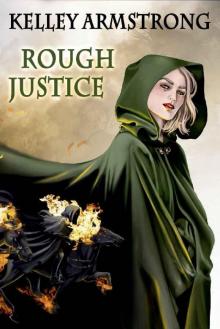 Rough Justice
Rough Justice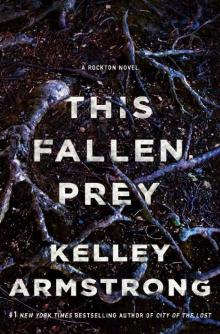 This Fallen Prey
This Fallen Prey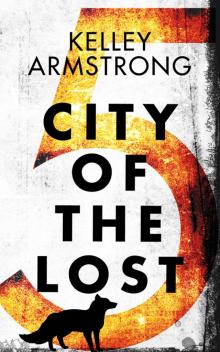 City of the Lost: Part Five
City of the Lost: Part Five Perfect Victim
Perfect Victim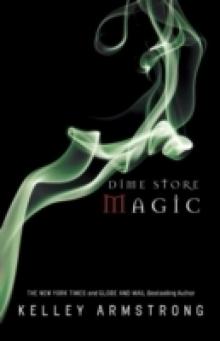 Dime Store Magic
Dime Store Magic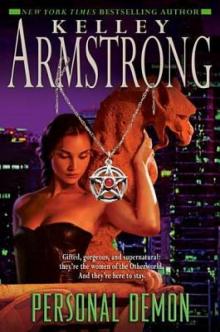 Personal Demon
Personal Demon Haunted
Haunted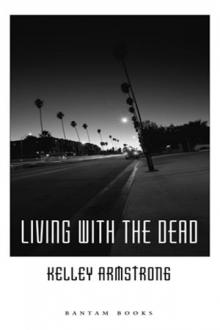 Living With the Dead
Living With the Dead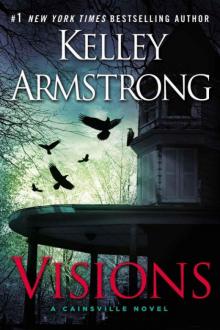 Visions
Visions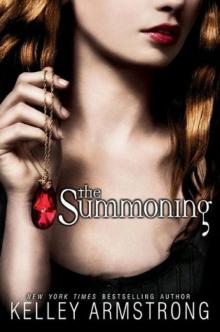 The Summoning
The Summoning Broken
Broken City of the Lost: Part One
City of the Lost: Part One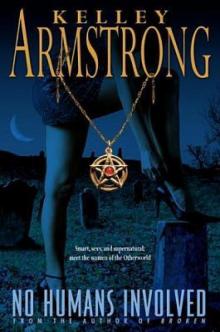 No Humans Involved
No Humans Involved The Awakening
The Awakening The Reckoning
The Reckoning The Gathering
The Gathering Bitten
Bitten Thirteen
Thirteen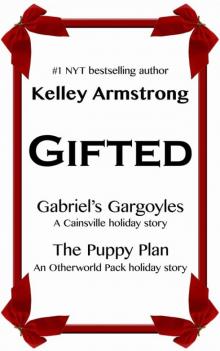 Gifted
Gifted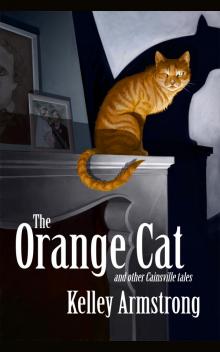 The Orange Cat and Other Cainsville Tales
The Orange Cat and Other Cainsville Tales Darkest Powers Bonus Pack 2
Darkest Powers Bonus Pack 2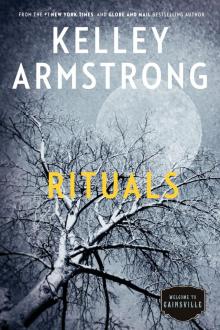 Rituals
Rituals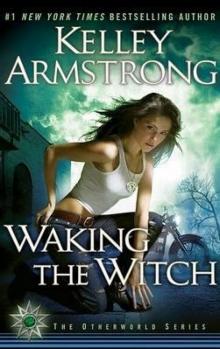 Waking the Witch
Waking the Witch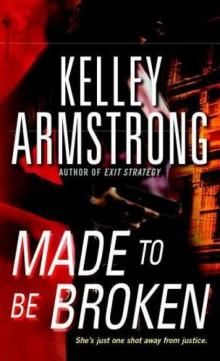 Made to Be Broken
Made to Be Broken Lost Souls
Lost Souls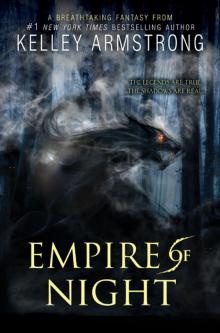 Empire of Night
Empire of Night Wild Justice
Wild Justice Double Play
Double Play Alone in the Wild
Alone in the Wild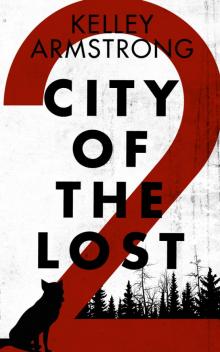 City of the Lost: Part Two
City of the Lost: Part Two A Stranger in Town
A Stranger in Town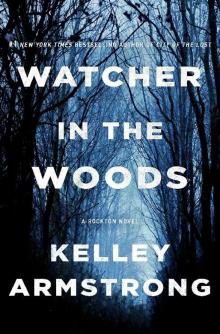 Watcher in the Woods: A Rockton Novel
Watcher in the Woods: A Rockton Novel Atoning
Atoning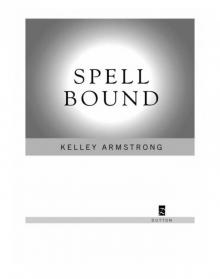 Spellbound
Spellbound Wolf's Bane
Wolf's Bane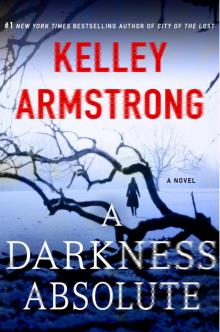 A Darkness Absolute
A Darkness Absolute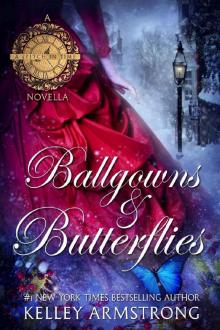 Ballgowns & Butterflies: A Stitch in Time Holiday Novella
Ballgowns & Butterflies: A Stitch in Time Holiday Novella Wherever She Goes
Wherever She Goes A Royal Guide to Monster Slaying
A Royal Guide to Monster Slaying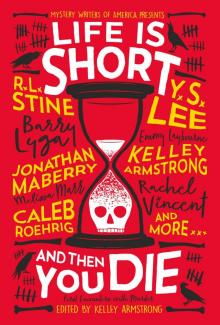 Life Is Short and Then You Die
Life Is Short and Then You Die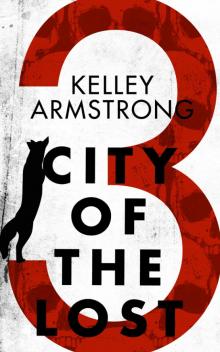 City of the Lost: Part Three
City of the Lost: Part Three Frostbitten
Frostbitten A Stitch in Time
A Stitch in Time Industrial Magic
Industrial Magic Wherever She Goes (ARC)
Wherever She Goes (ARC)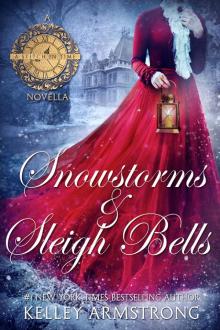 Snowstorms & Sleigh Bells: A Stitch in Time holiday novella
Snowstorms & Sleigh Bells: A Stitch in Time holiday novella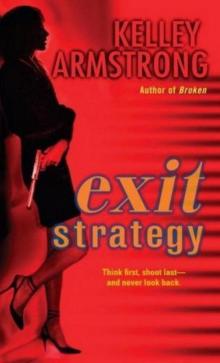 Exit Strategy
Exit Strategy Forest of Ruin
Forest of Ruin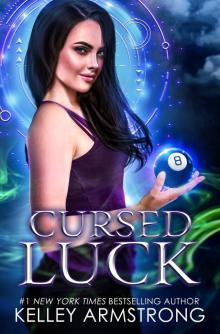 Cursed Luck, Book 1
Cursed Luck, Book 1 The Gryphon's Lair
The Gryphon's Lair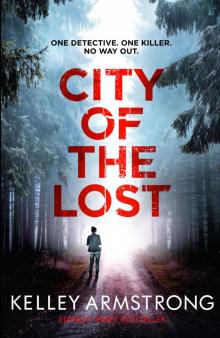 City of the Lost
City of the Lost City of the Lost: Part Four
City of the Lost: Part Four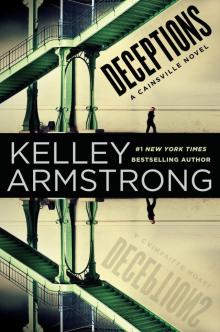 Deceptions
Deceptions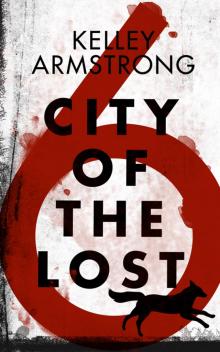 City of the Lost: Part Six
City of the Lost: Part Six Urban Enemies
Urban Enemies Stolen
Stolen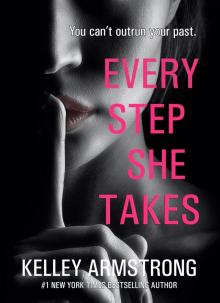 Every Step She Takes
Every Step She Takes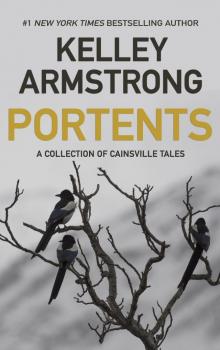 Portents
Portents Wolf's Curse
Wolf's Curse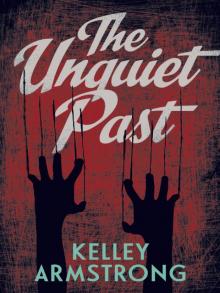 The Unquiet past
The Unquiet past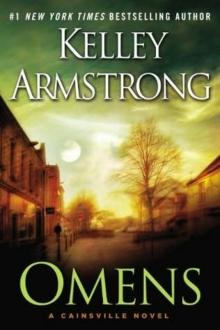 Omens ct-1
Omens ct-1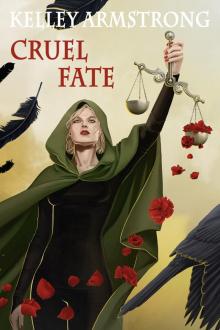 Cruel Fate
Cruel Fate The Calling dr-2
The Calling dr-2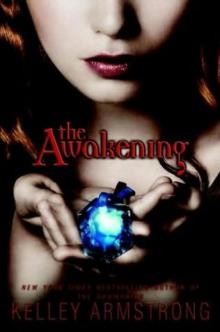 The Awakening dp-2
The Awakening dp-2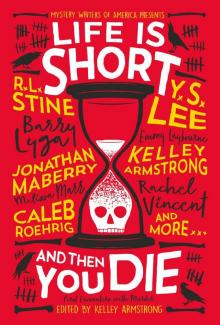 Life Is Short and Then You Die_First Encounters With Murder From Mystery Writers of America
Life Is Short and Then You Die_First Encounters With Murder From Mystery Writers of America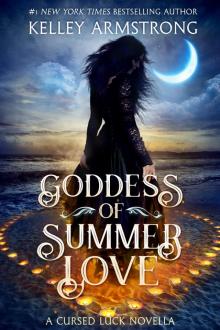 Goddess of Summer Love: a Cursed Luck novella
Goddess of Summer Love: a Cursed Luck novella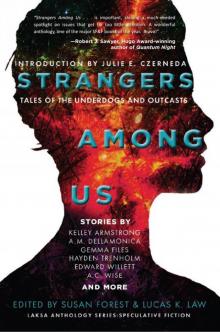 Strangers Among Us
Strangers Among Us The Gathering dr-1
The Gathering dr-1 The Rising dr-3
The Rising dr-3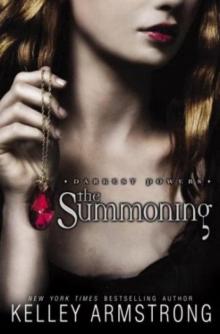 The Summoning dp-1
The Summoning dp-1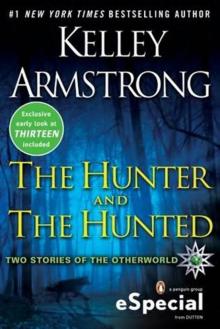 The Hunter And The Hunted
The Hunter And The Hunted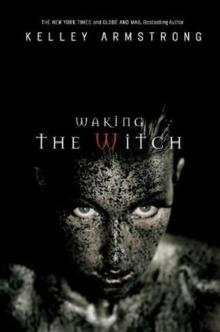 Waking the Witch woto-11
Waking the Witch woto-11